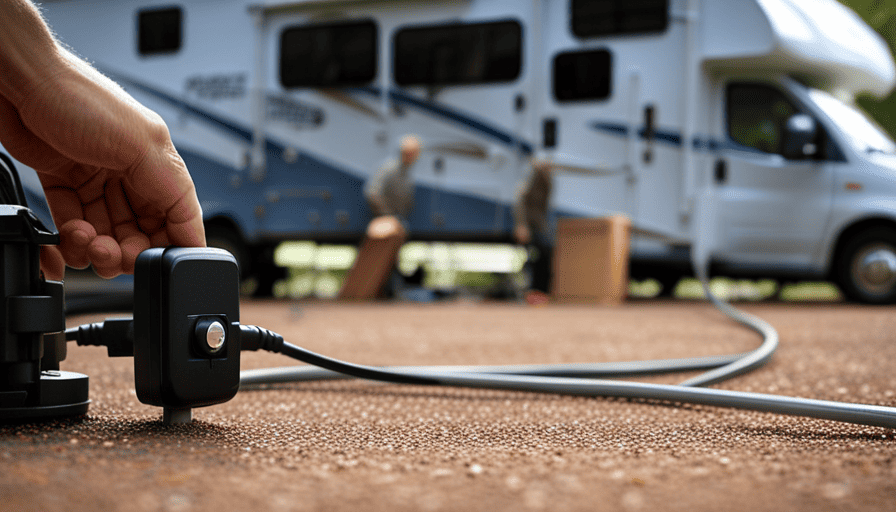Ever thought about how long a camper battery can endure?
Well, let me tell you, it’s like having a superhero by your side, ready to power your adventures!
Picture this: you’re out in the great outdoors, surrounded by nature’s beauty, and your trusty camper battery is there, tirelessly providing you with electricity. It’s a true marvel of technology and convenience.
In this article, we will dive deep into the world of camper batteries. We will explore the different types available, understand the factors that can affect their lifespan, and even learn how to calculate their battery life. Plus, I’ll share some valuable tips on how to extend the life of your camper battery, including the use of solar power.
But it’s not all sunshine and rainbows. We will also discuss battery safety and maintenance, as well as troubleshoot common battery issues that may arise. And if you’re looking to upgrade your camper battery system, we’ve got you covered too.
So, buckle up and get ready to uncover the secrets of camper batteries. Let’s ensure you never run out of power on your outdoor adventures again!
Key Takeaways
- The lifespan of a camper battery is influenced by factors such as usage patterns, temperature extremes, charging practices, and maintenance.
- Different types of camper batteries have varying characteristics and advantages. Deep cycle batteries provide steady power but require maintenance, lithium-ion batteries are lightweight and have a longer lifespan, and AGM batteries are maintenance-free and resistant to shock and vibration.
- Estimating power consumption and choosing the right battery size is important for maximizing battery life.
- Solar power can extend the lifespan of a camper battery, as it provides a renewable energy source and reduces reliance on traditional power sources. Proper installation of solar panels, along with the use of charging controllers and regular maintenance, is crucial for optimal energy generation and storage.
Understanding the Types of Camper Batteries
If you’re wondering how long a camper battery lasts, it all depends on the type of battery you’re using. There are different types of batteries commonly used in campers, including deep cycle batteries, lithium-ion batteries, and AGM batteries. Each type has its own advantages and disadvantages when it comes to battery capacity and maintenance.
Deep cycle batteries are known for their ability to provide a steady amount of power over a long period of time. They have a high capacity, which means they can store a large amount of energy. However, they require regular maintenance, such as checking the water levels and cleaning the terminals, to ensure optimal performance.
Lithium-ion batteries, on the other hand, are lightweight and have a longer lifespan compared to deep cycle batteries. They also have a high capacity and require minimal maintenance. However, they are more expensive upfront.
AGM batteries are a popular choice for campers because they are maintenance-free and have a good battery capacity. They are also more resistant to shock and vibration, making them suitable for off-road adventures.
Factors affecting camper battery lifespan include usage patterns, temperature extremes, and charging practices. By understanding the different types of batteries and considering these factors, you can determine how long your camper battery will last and take steps to maximize its lifespan. With the right battery and proper maintenance, you can ensure a reliable power source for your camping adventures.
Factors Affecting Camper Battery Lifespan
One key factor that impacts how much time you can enjoy your camper before needing to recharge is the lifespan of the battery. The battery charging process and the battery capacity are two crucial factors that affect how long a camper battery lasts.
Here are four factors that can affect the lifespan of your camper battery:
-
Battery charging: The way you charge your battery can greatly impact its lifespan. Using a high-quality charger and avoiding overcharging or undercharging can help prolong the battery life.
-
Battery capacity: The capacity of your battery determines how much energy it can store. A higher capacity battery will generally last longer than a lower capacity one.
-
Temperature: Extreme temperatures, both hot and cold, can reduce the lifespan of your camper battery. It’s important to keep the battery in a moderate temperature range.
-
Maintenance: Regular maintenance, such as cleaning the battery terminals and checking the water levels (for flooded batteries), can help extend the lifespan of your camper battery.
Understanding these factors can help you maximize the lifespan of your camper battery and ensure you have enough power for your adventures. In the next section, we’ll explore how to calculate the battery life without writing a step.
Calculating Battery Life
When it comes to calculating battery life for a camper, there are three key points to consider: the amp-hour rating, power consumption estimation, and battery efficiency.
The amp-hour rating indicates the amount of energy a battery can deliver over a certain period of time.
Power consumption estimation involves determining how much power your camper appliances and devices will draw from the battery.
Lastly, battery efficiency refers to how effectively the battery can convert stored energy into usable power.
Taking these factors into account will help ensure you have a good understanding of how long your camper battery will last.
Amp-Hour Rating
To really appreciate the longevity of your camper battery, picture it as a reliable friend who sticks around for hours on end, keeping your adventures powered up. One important factor to consider is the amp-hour rating of your battery. This rating tells you how much current the battery can supply over a specific period of time.
For example, if your battery has a rating of 100 amp-hours, it can provide 1 amp of current for 100 hours, or 10 amps for 10 hours. Another crucial aspect is the battery discharge rate, which determines how fast the battery loses its charge. By understanding the amp-hour capacity and discharge rate, you can estimate how long your camper battery will last before needing a recharge.
Moving on to power consumption estimation, let’s explore how to calculate the energy needs of your camper appliances.
Power Consumption Estimation
Imagine being able to accurately estimate the energy needs of all your camper appliances, so you can fully enjoy your adventures without any worries. Power consumption estimation is a crucial step in battery capacity planning for campers. By understanding how much power each appliance consumes, you can determine the appropriate battery size and avoid unexpected power shortages during your trips.
To estimate power consumption, start by identifying the wattage of each appliance and the number of hours you plan to use it. Multiply the wattage by the number of hours to calculate the energy in watt-hours. Add up the energy requirements for all appliances to determine the total power consumption. This estimation will help you choose a battery with sufficient capacity to meet your needs.
Moving on to the next section about battery efficiency, it’s important to consider how efficiently the battery converts stored energy into usable power.
Battery Efficiency
You can make your camper’s battery work smarter, not harder, by considering its efficiency and how effectively it converts stored energy into usable power.
When it comes to battery charging, there are a few things to keep in mind. Firstly, using a smart charger can help optimize the charging process and extend battery life.
Secondly, it’s important to avoid overcharging the battery, as this can lead to decreased efficiency and potential damage.
Lastly, regularly checking and maintaining battery connections can ensure proper charging and prevent energy loss.
Additionally, understanding your battery’s capacity is crucial. Knowing the amount of energy your battery can store will help you gauge how long it will last and plan accordingly.
By maximizing battery efficiency and understanding your battery’s capacity, you can make the most of your camper’s power supply.
In the next section, we will discuss tips to extend camper battery life without compromising your power needs.
Tips to Extend Camper Battery Life
One simple trick that can significantly extend your camper battery life is by regularly monitoring and adjusting your power usage.
One way to increase battery capacity is by investing in a larger battery or adding additional batteries to your setup. This will provide more power and allow you to run your camper for a longer period of time without needing to recharge.
Another important factor to consider is the battery charging technique you use. Opt for a smart charger that can automatically adjust the charging voltage and current based on the battery’s needs. This will prevent overcharging and extend the battery’s lifespan.
Additionally, avoid deep discharges as much as possible, as it can shorten the battery’s life. Instead, aim for shallow discharges and recharge the battery before it reaches a critically low level.
By following these tips, you can maximize your camper battery life and ensure a reliable power source during your adventures. Speaking of reliable power sources, using solar power is another great way to extend your battery life.
Using Solar Power to Extend Battery Life
When it comes to extending the battery life of my camper, using solar power has been a game-changer. One of the key points to consider is the installation of solar panels on the roof of the camper, which allows for a constant source of renewable energy.
Additionally, investing in a charging controller helps regulate the flow of power from the solar panels to the battery, ensuring optimal charging efficiency.
The benefits of solar power are numerous, including reducing reliance on traditional power sources, saving money on electricity bills, and being more environmentally friendly.
Solar Panel Installation
Installing solar panels on your camper can greatly extend the lifespan of your camper battery. Solar panel efficiency plays a crucial role in maximizing the amount of energy that can be harvested from the sun. It determines how much power can be generated by the panels and how quickly they can charge your battery.
When choosing solar panels for your camper, it’s important to consider their efficiency rating to ensure optimal performance. Another factor to consider is the battery capacity, as it determines how much energy can be stored and used when the sun is not shining. By installing solar panels with high efficiency and pairing them with a battery with ample capacity, you can ensure that your camper battery lasts longer and provides reliable power.
Transitioning into the next section, a charging controller is essential to regulate the flow of electricity from the solar panels to the battery.
Charging Controller
When it comes to maximizing the efficiency of your camper’s solar panel system, a charging controller plays a crucial role. This device regulates the flow of electricity from the solar panels to the battery, ensuring that it charges at an optimal speed while protecting it from overcharging.
A good charging controller can significantly extend your battery’s lifespan by preventing damage caused by excessive charging or discharging. It also allows you to monitor the charging status and battery health, providing valuable information for maintenance and troubleshooting.
To further enhance your understanding, let’s dive into two important aspects related to charging controllers:
-
MPPT vs PWM: The two main types of charging controllers, MPPT (Maximum Power Point Tracking) and PWM (Pulse Width Modulation), have different capabilities and charging speeds.
-
Battery Charging Algorithms: Charging controllers employ various algorithms to optimize the charging process, including bulk, absorption, and float charging stages.
Now that we’ve explored the charging controller, let’s move on to the next section about the benefits of solar power without skipping a beat.
Solar Power Benefits
Harnessing the power of solar energy can revolutionize your camping experience, providing you with a sustainable and reliable source of electricity to power your adventures. Solar power efficiency is a crucial factor to consider when investing in solar panels for your camper. The efficiency of solar panels refers to the amount of sunlight they convert into usable electricity. Higher efficiency panels are able to generate more power with the same amount of sunlight, making them a better choice for campers with limited space. Additionally, solar panel maintenance is important to ensure optimal performance and longevity. Regularly cleaning the panels and checking for any damage or debris can help maximize their efficiency. By properly maintaining your solar panels and choosing high-efficiency options, you can ensure a steady supply of electricity for your camping needs. Transitioning into backup power options, it’s important to have a plan in case of unforeseen circumstances.
Backup Power Options
If you find yourself in need of backup power options while camping, there are several alternatives to consider.
One option is to increase your battery capacity. This can be done by either upgrading your existing battery to one with a higher capacity or by adding additional batteries to your setup. By doing so, you can extend the amount of time your camper battery will last before needing to be recharged.
Another option is to use a generator. Generators can provide a reliable source of backup power, especially if you’re camping in a location with limited sunlight for solar power. There are various generator options available, including portable generators and inverter generators, which are known for their quiet operation. These generators can supply power to your camper’s electrical system, allowing you to use your appliances and charge your devices. However, it’s important to keep in mind that generators require fuel, so you’ll need to plan accordingly.
When considering backup power options for your camper, it’s essential to prioritize safety and maintenance. This includes regularly checking your battery’s charge level, ensuring proper ventilation for generators, and following manufacturer guidelines for maintenance. By taking these precautions, you can ensure a reliable power source for your camping adventures.
Transitioning into the next section about battery safety and maintenance, it’s crucial to understand the importance of taking care of your camper battery to prolong its lifespan.
Battery Safety and Maintenance
Battery safety and maintenance are crucial aspects of camper battery management. To ensure optimal performance and longevity, it’s important to regularly inspect the battery for any signs of damage or corrosion. Cleaning the battery and ensuring proper ventilation are also essential to prevent overheating and potential hazards. Additionally, safe battery handling practices should be followed to minimize the risk of accidents or injuries.
Battery Inspection
When you’re checking out your camper, take a quick look at the battery to make sure everything’s running smoothly. Battery maintenance is crucial for the longevity and performance of your camper’s battery. Here are some key things to inspect:
-
Battery terminals: Check for any signs of corrosion or loose connections. Clean and tighten them if necessary.
-
Battery capacity: Use a voltmeter to measure the battery’s voltage. A healthy battery should read around 12.6 volts. Anything significantly lower may indicate a weak or dying battery.
-
Battery fluid: If you have a lead-acid battery, check the fluid levels. Add distilled water if needed, but be careful not to overfill.
-
Battery case: Inspect the battery case for any cracks or damage. A damaged case can lead to leaks or even a total battery failure.
After inspecting the battery, it’s time to move on to the next section about cleaning and ventilation.
Cleaning and Ventilation
To ensure optimal performance, it’s important to regularly clean and properly ventilate your camper. Proper ventilation maintenance is crucial for the longevity of your camper battery.
Over time, dust and debris can accumulate on the battery terminals and hinder its performance. To clean the battery, start by disconnecting the negative terminal and using a wire brush to remove any corrosion or buildup. Ensure the area around the battery is well-ventilated and free from any flammable materials.
Additionally, check the battery vents for any blockages and clean them if necessary. This will prevent the buildup of harmful gases and maintain a safe operating environment.
By implementing these cleaning techniques and maintaining proper ventilation, you can prolong the life of your camper battery.
Moving on to safe battery handling, it’s important to follow certain precautions to avoid any accidents or mishaps.
Safe Battery Handling
Properly handling your camper’s battery is essential for ensuring a safe and enjoyable camping experience. When it comes to battery charging, it is crucial to follow the manufacturer’s instructions and use a dedicated battery charger. Avoid overcharging the battery, as it can lead to damage and reduce its lifespan. Additionally, always store the battery in a cool and dry place to prevent it from losing its charge. To help you visualize the importance of safe battery handling, here is a table showing the potential consequences of mishandling a camper battery:
| Battery Mishandling | Consequences |
|---|---|
| Overcharging | Reduced lifespan, damage to battery |
| Improper storage | Battery losing charge, decreased performance |
By understanding these risks, you can ensure that your battery remains in good condition for longer. Now, let’s move on to troubleshooting common battery issues without skipping a beat.
Troubleshooting Common Battery Issues
When it comes to troubleshooting common battery issues in a camper, there are a few key points to keep in mind.
Firstly, low voltage problems can occur due to a variety of reasons such as a weak battery or a faulty charging system.
Secondly, battery drainage can be a frustrating issue that often stems from leaving appliances or lights on for extended periods of time.
Lastly, faulty wiring can cause a number of problems, including short circuits or power loss.
It’s important to address these issues promptly to ensure the longevity and reliability of your camper’s battery.
Low Voltage Problems
Beware of low voltage issues as they can drain your camper battery faster than you think! Troubleshooting low voltage problems is crucial to preventing battery drain and ensuring a longer battery life. One common cause of low voltage is leaving lights or appliances on when the camper is not in use. To avoid this, always double-check that everything is turned off before leaving the camper. Another culprit could be a faulty converter or inverter, which can cause the battery to drain even when not in use. Regularly inspecting and maintaining these components can help prevent low voltage issues. Additionally, investing in a good quality battery and keeping it properly charged can greatly extend its lifespan. In the next section, we will explore the topic of battery drainage and how to address it effectively.
Battery Drainage
As I mentioned earlier, low voltage problems can be a major concern for campers. However, another issue that can significantly impact the battery life of a camper is battery drainage. To ensure the longevity of your camper battery, it’s crucial to understand how to preserve and maintain it properly. Here are four important tips to help you achieve this:
-
Minimize vampire loads by unplugging any unnecessary devices or appliances when not in use.
-
Invest in a battery cutoff switch to prevent any power drain when the camper isn’t in use.
-
Regularly check the battery for any signs of corrosion and clean it if necessary.
-
Consider using solar panels or a generator to recharge the battery during extended camping trips.
By following these battery preservation and maintenance practices, you can maximize the lifespan of your camper battery.
Now, let’s move on to the next section and discuss the potential issues caused by faulty wiring.
Faulty Wiring
To prevent potential hazards and ensure a smooth camping experience, you need to be cautious of faulty wiring that can ignite a dangerous and chaotic situation. Troubleshooting wiring issues is crucial to preventing electrical fires in your camper.
Start by checking for frayed or exposed wires, loose connections, or any signs of overheating. If you notice any of these issues, it’s important to address them immediately. Replace damaged wires and tighten loose connections to prevent further problems.
Additionally, make sure to use the correct gauge wire for your camper’s electrical system to avoid overloading the circuit. By taking these precautions, you can significantly reduce the risk of electrical fires and ensure the safety of your camping adventure.
Now, let’s move on to upgrading your camper battery system for an even better experience.
Upgrading Your Camper Battery System
Upgrade your camper battery system to ensure that you have enough power to last for extended periods of time. When it comes to upgrading battery capacity, there are a few options to consider.
Firstly, you can replace your current battery with a higher capacity one. This will allow you to store more energy and have a longer-lasting power source.
Another option is to add an additional battery to your system. This will increase the overall capacity and give you even more power to rely on.
Lastly, you can upgrade your battery charging methods. Installing a solar panel system on your camper roof can provide a sustainable and efficient way to charge your batteries while on the road.
By upgrading your camper battery system, you can have peace of mind knowing that you won’t run out of power during your adventures. With a higher capacity battery or an additional battery, you can extend your camping trips without worrying about running out of power. And with a solar panel system, you can rely on the sun to keep your batteries charged, reducing the need to rely on external power sources.
Upgrading your camper battery system is a smart investment for any avid camper. With the ability to increase battery capacity and utilize sustainable charging methods, you can enjoy longer trips and a worry-free camping experience.
Conclusion and Final Tips
Now that we’ve discussed upgrading your camper battery system, let’s move on to the conclusion and final tips for battery charging and maintenance.
When it comes to keeping your camper battery in good condition, proper charging is essential. You should always use a charger specifically designed for deep cycle batteries, as this’ll ensure a safe and efficient charging process. It’s important to follow the manufacturer’s instructions and guidelines for charging your battery, as overcharging or undercharging can significantly reduce its lifespan.
Regular battery maintenance is also crucial for maximizing its longevity. This includes regularly checking the battery connections for any signs of corrosion and cleaning them if necessary. Additionally, you should inspect the battery for any physical damage and replace it if needed.
Another tip for battery maintenance is to avoid discharging the battery completely. Deep discharges can lead to sulfation, a process that can damage the battery and reduce its capacity over time. Instead, aim to keep the battery level between 50% and 80% whenever possible.
By following these tips for battery charging and maintenance, you can ensure that your camper battery lasts as long as possible, allowing you to enjoy your outdoor adventures without any power interruptions.
Frequently Asked Questions
What are the different types of camper batteries and their advantages and disadvantages?
There are several types of camper batteries, each with their own advantages and disadvantages.
One popular option is lithium batteries, which offer a longer lifespan and faster charging times compared to traditional lead-acid batteries. However, they can be more expensive.
When it comes to long term storage, lithium batteries are often the best choice due to their low self-discharge rate.
Overall, it’s important to consider your specific needs and budget when choosing a camper battery.
How do I calculate the battery life based on my specific camper’s power consumption?
To calculate the battery life of your specific camper, it’s important to consider the battery capacity and estimate your power usage.
Firstly, determine the capacity of your battery, which is typically measured in amp-hours (Ah).
Then, estimate the power consumption of your camper’s appliances and devices.
By dividing the battery capacity by the estimated power usage, you can calculate the approximate battery life.
Keep in mind that factors like weather conditions and battery age can affect the actual battery life.
Are there any tips or tricks to extend the lifespan of my camper battery?
To extend the lifespan of your camper battery, there are a few key tips for maintenance that you should follow.
Firstly, avoid overcharging your battery as this can lead to damage.
It’s also important to regularly check and clean the battery terminals to prevent corrosion.
Additionally, store your battery in a cool, dry place when not in use.
Lastly, avoid using excessive power-consuming appliances and be mindful of your battery’s capacity to avoid draining it too quickly.
By following these tips and avoiding common mistakes, you can maximize the lifespan of your camper battery.
Can I use solar power to extend the battery life of my camper? How does it work?
I once went on a camping trip with my camper van, relying solely on solar power to extend the life of my battery. It was an amazing experience. Solar panels for camper batteries work by converting sunlight into electricity, which charges the battery. This allows you to power your appliances and devices without draining the battery’s energy. It’s a sustainable and efficient way to ensure your camper battery lasts longer, giving you more time to enjoy your adventures.
What are the backup power options available for camper batteries in case of emergencies or power outages?
In case of emergencies or power outages, there are several alternative power sources available for camper batteries. One option is to use portable generators, which can provide a reliable source of electricity when needed. These generators are designed to be easily transported and can be fueled by gasoline or propane. They offer a convenient backup power solution for campers, ensuring that you have access to electricity when your camper battery is not sufficient.
Is the Length of Camper Battery Life Related to the Financing Terms of a Camper?
The length of camper battery life does not directly correlate with the financing options for camper duration. While financing terms determine the payment period for purchasing a camper, battery life depends on the quality and maintenance of the battery itself. These two factors are independent of each other and require separate considerations.
Conclusion
In conclusion, the lifespan of a camper battery depends on various factors such as the type of battery, usage, and maintenance. Just like a marathon runner needs proper training and care to go the distance, a camper battery requires regular check-ups and proper handling to last longer.
By following the tips mentioned in this article, you can extend the life of your camper battery like a well-tuned instrument playing a harmonious melody. Remember, proper maintenance and usage are the keys to keeping your camper battery running smoothly and efficiently.










